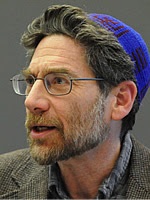Our Beating Heart, Our Cheating Heart
 As we move forward in our Shabbat morning prayers, we arrive at one of our most anticipated destinations. Early in the morning we thanked God for bequeathing to us a tradition that gives us the chance to declare every day: “Sh’ma Yisra’el – Hear, O Israel, the Eternal is our Almighty God, the Eternal is One!” At that earlier point in the service we were simply talking about reciting the Sh’ma. We deem it a privilege to do so and look forward to it. And now we have actually reached that moment. We chant or recite these words slowly, with our eyes gently covered by our hand, striving to hear the words we speak and striving to say them with meaning.
As we move forward in our Shabbat morning prayers, we arrive at one of our most anticipated destinations. Early in the morning we thanked God for bequeathing to us a tradition that gives us the chance to declare every day: “Sh’ma Yisra’el – Hear, O Israel, the Eternal is our Almighty God, the Eternal is One!” At that earlier point in the service we were simply talking about reciting the Sh’ma. We deem it a privilege to do so and look forward to it. And now we have actually reached that moment. We chant or recite these words slowly, with our eyes gently covered by our hand, striving to hear the words we speak and striving to say them with meaning.
What is the meaning that we seek to summon in our declaration of God’s oneness? It is not so much an intellectual proposition as it is a feeling. It is the feeling of love that we offer in return for God’s love, the love we celebrated in the blessing that introduces the Sh’ma. We hear the summons to “love the Eternal your Almighty God with all your heart, with all your soul and with all your might.”
In what way is the recitation of the Sh’ma meant to be an act of love? In part, we hope that a feeling of love will well up in our hearts as we call to mind that God is One. Again, the thrust of this statement is not so much its statement of theological fact. We are no longer engaged in fierce polemics with polytheistic religious systems of thought. Instead, we declare that God is our Beloved One, our Only One.
Moreover, we recall to ourselves the difference between our own sense of being as compared to that of our Creator. We are complex creatures, composed of many and varied parts. These parts engender within us multiple and sometimes warring thoughts, concerns and impulses. We are made up of heart, soul and sundry powers, our “might.” We work overtime in keeping these divergent elements balanced and cooperating. Sometimes we succeed and many times we do not. The Sh’ma seeks to help us collect ourselves, just as we collect the four corners of our tallit in readiness for speaking out the loving words of the Sh’ma. We pull ourselves together from our far-flung dispersion of heart and mind, soul and might.
And it is not only in the multiplicity of within us of heart, soul, and other capacities. We are divided within our hearts themselves. The “cheatin’ heart” is an all-too-well-known human reality. We are heirs to a long tradition that describes the heart as a willful and independent agent that will not take orders but will rather take over our thoughts and actions against our other wishes. The Sages noticed that this idea is expressed in the very word that the Sh’ma uses for “heart.” In Hebrew the usual word for heart is “lev.” But in our verse the word used is “levav” – with an extra letter “bet.” Not only is the word given another letter, but that letter signifies the number 2. Thus, the Sages point out that we often have more than one heart. In English we refer to a person acting from a unified heart as “wholehearted.” Nonetheless, we are so often aware that we possess a divided heart, torn in opposing directions or distracted from a unified focus. At the end of the Sh’ma we are warned that our hearts may lead us astray. So, as we gaze upon the diverse strands of our tallit, strands that we have gathered up together and placed against our heart, the Sh’ma has us hold before ourselves an image of wholeness and completeness, the image of God as One. The force that can resue us from feeling “at loose ends” and that can bind together our multiple and divided selves with the Source of Oneness is the force of love. This goal is achievable, says the Sh’ma. We are capable of loving God and of serving God with all our hearts.
These words of the Sh’ma are taken from our Torah. They are part of a long selection of three full paragraphs of Scripture that comprise this prayer. The Sh’ma’s celebration of loving connection to the Unique Oneness of Being is, itself, a unique prayer. Until now we have been chanting blessings written by the Rabbis and Psalms written by other inspired authors, such as King David. These prayers warm our spirits and guide us forward toward a rendezvous with the Holy Blessed One. But when we reach for the heart of the matter, we do not recite anything but words from the Five Books of Moses, from the Torah, the heart of our covenantal tradition.
These three paragraphs are a loving creation of our Sages. They are selected from different parts of our Torah and joined together to form one whole, just as we are meant to draw together the different pieces of our selves and hold them together in unity. The Sh’ma, recognized as a fundamental declaration of faith in God, is also a fundamental declaration of faith in us, in our potential and capacity for love and wholeness.
The Sages discuss a seemingly legalistic detail of this practice. The Sh’ma is supposed to be recited in the morning (- hence its placement in the morning prayers). So they ask: From what time can a person recite the Morning Sh’ma? From what time may we consider that morning has arrived? One answer is plainly reasonable and rational. Since we are meant to hold the strands of the tzizit and gaze at them while we recite these words, we must wait until there is enough light to distinguish the strands of the tzizit.
But the answer that we codify in the law offers a different criterion, an answer that does not speak in such logical terms. Instead it establishes that one may recite the Sh’ma when morning is light enough “so that one can make out and recognize a person whom one knows only casually and who is not standing too close.” The moment when we can begin to speak the words that recognize the Divine as our Unique Beloved God is that same moment when we can begin to recognize another person in the murky hour of dawn. It is a moment of uncertainty. What if we call out and are mistaken? What if that person is not who we think? But we take a chance and speak out. That courageous act of hopeful recognition is an act of reaching out and unification with another. As we recite the Sh’ma we may recognize that the stranger we call out to in our uncertainty is God. Or, perhaps, that stranger is us.
